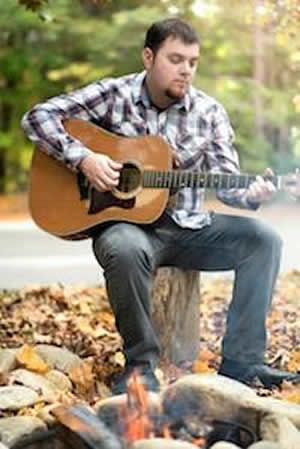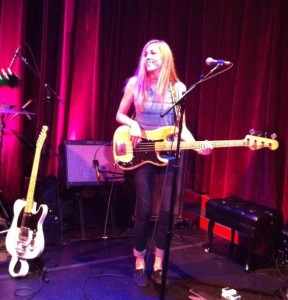 Annie Hoffman is a double success story in the Boston music scene. She is the bass player for the hugely popular, highly in demand band The Field Effect. The young lady is also making her mark as a skillful sound engineer at Zippah Recording Studios in Brighton, Massachusetts. Zippah is booked for the next several weeks with artists looking to record music, and The Field Effect recently won a Song Of The Year award at Boston Music Awards.
Annie Hoffman is a double success story in the Boston music scene. She is the bass player for the hugely popular, highly in demand band The Field Effect. The young lady is also making her mark as a skillful sound engineer at Zippah Recording Studios in Brighton, Massachusetts. Zippah is booked for the next several weeks with artists looking to record music, and The Field Effect recently won a Song Of The Year award at Boston Music Awards.
Hoffman believes her band’s success has to do with its high energy performances resonating with audiences. “I think when people go to see a show, they want to see the people on stage having a good time, and it’s kind of contagious,” she said. “The songs are solid. There’s hooks, and people seem to connect with them. It’s a good starting point.”
Hoffman said winning, just two months ago, the Boston Music Award for Song Of The Year was quite an honor and a surprise. She and her band mates were excited just to be nominated but didn’t imagine they’d best the other stellar acts.
“I don’t think anybody expected it,” Hoffman said. “No one was really prepared when the award ceremony started. I was in line to get a drink. My friend came running in to say ‘Oh my God, you guys won.’ I thought he was joking.”
Hoffman noted that Bad Rabbit, now a national act, was one of the other nominees for the best song award. “We were just so psyched to be on the ballot to begin with and winning was just a whole other level of awesomeness,” she exclaimed.
Aside from playing bass guitar in her band, Hoffman also recorded their last full length album and their EP. “We’re working on a new one now,” she said. “My boss and I work on it. We’re producing it, my boss Brian Charles.” Charles, of course, is the well-respected owner of Zippah Recording Studios.
The Field Effect is known for their melodic integrity and solid rhythms. Front man Doug Orey wrote the songs for the first recording. The band would then take the lyrics and melody lines from Orey and flesh them out and built them up from his skelleton. As time went by, the entire band got more involved with coming up with song parts. Each will come up with a part and then the others will add something to it. “It’s a really organic creative process,” Hoffman said.
Their EP, titled This EP Will Self Destruct, and their first full length, Cartography, were recorded at Zippah studios where she works. She engineered it. Her boss, Brian Charles, who helped somewhat with the EP, got even more involved with the first full length because he likes the band, and he has signed them to his label.
As if Hoffman isn’t busy enough, last year she played all of the bass tracks on an album by a band called Thought Transfer. She was also one of the engineers on that project.
Hoffman became interested in a career in sound engineering when, as a teenager, she met and went to see a live sound engineer for the touring band Rusted Roots. She was invited to check out things back stage, including the sound rig.
“I was like ‘Oh my gosh,’ this is the coolest sound I’ve ever heard,” she exclaimed. “So, for a long time I thought I wanted to be a live sound engineer and travel with a band. But as I learned more about it, I realized what a strenuous and stressful job it is. You have to tear stuff down every night. Travel to the next city. Set it all back up. Work until the end of the show. Tear it all back down. Rinse and repeat. That’s when I realized that the studio is probably a better fit for me. I’m fascinated by the technology and by the creative elements of it as well. Since I learned about it, it’s always been a real fascination of mine and I love working in the studio.”
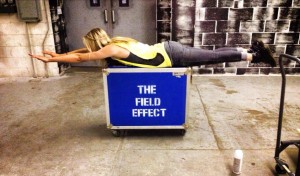 Eventually, Hoffman said, that the technological aspects like compression ratios and thresholds eventually faded into the background as she, as engineer, developed instincts and just started going by what she’s hearing. “It becomes more like a creative art as opposed to science or an engineering,” she said. “There is a lot of signal flow and science involved, but once you’ve been doing it for several years, it becomes like art. Every day is different. Every band and artist is different, and it’s a really fun job.”
Eventually, Hoffman said, that the technological aspects like compression ratios and thresholds eventually faded into the background as she, as engineer, developed instincts and just started going by what she’s hearing. “It becomes more like a creative art as opposed to science or an engineering,” she said. “There is a lot of signal flow and science involved, but once you’ve been doing it for several years, it becomes like art. Every day is different. Every band and artist is different, and it’s a really fun job.”
Hoffman received her BA in Music Production And Sound Engineering at Berklee College Of Music. She cut her teeth at Berklee’s Studio Operations while in work study program, working in the studio office helping other students when they ran into problems during practice time. She also worked a lot with visiting artists. Her first internship was at Blue Jay Recording Studio out in beautiful Carlisle, Massachusetts, where she worked for a year before she went to work at Zippah. “We got so busy at Zippah, I just couldn’t afford go work for free at Blue Jay any more,” she said.
One of the most beneficial aspects about going through a four year program at Berklee: “You get four years to make mistakes and learn from them when there aren’t clients paying by the hour,” she said. “Once you’re out in the real world, there’s this whole new set of pressures that you have to be prepared for. People are paying good money and they’re taking their art seriously and tensions can get high. Learning not what to do ahead of time was the biggest thing for me.”
Hoffman came to work for Brian Charles at Zippah shortly after she realized the studio was located just down the street from where she was living. Doing research online, she found Zippah’s website and thought it was a cool studio. “Then I saw at the bottom of the screen, the address which was in Brighton, and walking distance from where I was living at the time. I was like ‘Holy cow,’” she exclaimed. After an e-mail exchange and a few meetings, the two studio people, veteran and novice, found they had similar interests and opinions and senses of humor.
“We hit it off really well and he invited me to sit in on a session that following Friday,” she said. “Instead of just sitting in to observe, I worked. I had the experience, and I think he recognized that right away and three days later he was like ‘So, ah, I think I want to hire you, if you’re cool with that.’ I’ve been there ever since.”
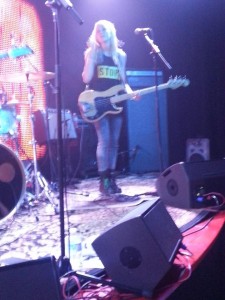 A lot of music fans might not know the precise difference between a producer and an engineer. Hoffman said the easiest definition is that “the producer oversees the entire vision of the album and is very involved with the artist and drawing the appropriate performance out of the artist as the recording process goes on. They’re also supposed to keep the engineer informed as to what colors and what sounds they’re looking for. Then it’s the engineer’s job to achieve that sound through the equipment, pick which microphone is right for the task at hand. Certain compressors are more aggressive sounding. Some are more musical sounding. You have to make the decision, technologically, based on what the vision of the producer is.”
A lot of music fans might not know the precise difference between a producer and an engineer. Hoffman said the easiest definition is that “the producer oversees the entire vision of the album and is very involved with the artist and drawing the appropriate performance out of the artist as the recording process goes on. They’re also supposed to keep the engineer informed as to what colors and what sounds they’re looking for. Then it’s the engineer’s job to achieve that sound through the equipment, pick which microphone is right for the task at hand. Certain compressors are more aggressive sounding. Some are more musical sounding. You have to make the decision, technologically, based on what the vision of the producer is.”
Aside from working on her own band’s recordings and the Thought Transfer project, Hoffman has, as a sound engineer, worked with and continues to work with many of Boston’s notable bands. She is currently working on a full length album with The Life Electric. She and her boss are also working with Mr. Vertigo. Hoffman and Charles have made a track with New Hampshire’s Mellow Bravo. They’re currently working on a full length with an artist named Rich Schroder who used to play with the band Zen Lunatic. They also recorded the most recent Shelia Devine reunion record. Dear Leader is another of their clients. As a small studio, Zippah is not a Mecca for national artists. But the studio is on a call list for an agency that places artists in certain studios when they’re passing through on tour and need to get something done for a label.
“So, actually, we almost had Justin Bieber in last summer,” she said. “Fortunately, it got cancelled. You hear things about that young man. He probably isn’t a pleasure to work with. I had to race back from Rhode Island in June or July because he was supposed to start a session that evening. He was in town and his label needed a track of vocals. They wanted to start earlier, so they ended up going somewhere else.”
Playing in a band as well as working as a sound engineer gives Hoffman unique insights into the relationship between artists and producers. From the engineer’s side of the glass she sees a lot of bands not trusting each other’s abilities. “If instead of second guessing each other, if they had a little more faith in each other, they might have a little more fun in the studio,” she said. “From the band side, I feel that knowing both sides of the glass allows me to be more efficient as an artist performing in the studio.”
Hoffman also said that bands and producers have a similar vision in mind 90 percent of the time. It is also common for a producer to push a band outside their comfort zone a little bit to get the best performance possible. Sometimes, though, artists and producers will have opposites visions of certain things.
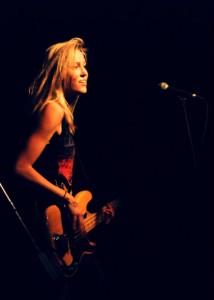 “We worked with a band recently. We were going for a kind of electronic pop sound. But, we wanted to use real drums,” she began. “In order to get kind of a poppy, almost electronic sound out of the drums, we had the drummer play the kick and snare separate from the cymbals. He went through and played a track with the kick and snare. Then, we were able to really psyche out the room mikes with compression without the cymbals mucking everything up. Then he went through and played the cymbals on top of what he just played. It sounds really cool. It sounds out of this world. Someone might not guess that they’re not drums, but they are indeed real, and we were able to tape loops of them and copy and paste them back to back so it adds even more of an electronic element to it.”
“We worked with a band recently. We were going for a kind of electronic pop sound. But, we wanted to use real drums,” she began. “In order to get kind of a poppy, almost electronic sound out of the drums, we had the drummer play the kick and snare separate from the cymbals. He went through and played a track with the kick and snare. Then, we were able to really psyche out the room mikes with compression without the cymbals mucking everything up. Then he went through and played the cymbals on top of what he just played. It sounds really cool. It sounds out of this world. Someone might not guess that they’re not drums, but they are indeed real, and we were able to tape loops of them and copy and paste them back to back so it adds even more of an electronic element to it.”
Three of the band’s four members loved it, but the drummer felt that his integrity as a player was being compromised. “He thought it sounded cool but he was little downtrodden about being changed into almost a robot. But, when you’re looking to the greater good of the song, you kind of have to make compromises. The rest of band was over the moon about it. He went along with it, but I know he wasn’t happy. So, there are sacrifices that people need to make. At the end of the day, the production team will make sacrifices because it is the band’s music and they get the final call. It’s always a very amicable exchange of opinions. But, people don’t always agree.”
Hoffman’s boss, Brian Charles, also plays in bands, and he too knows both sides of the glass. She related how he and a previous band of his, after signing with Interscope, had to work with a producer who tried to make his band sound like Creed or Bush. “He’s been through the worst of it, and he has a very good understanding, and he’s really sensitive to people’s concerns.”
Hoffman would like to see her own band get more recognition on a higher level. “I’m really impressed with how far we’ve come in the local scene,” she said. “We get show offers left and right. People love to come see us. We get radio play and all that stuff, and it’s really fun. I would love nothing more than to take that to a regional level or even a national level and go on some tours. Right now, we’re just playing a show a month here, a show a month there. Sometimes we go to New York, but we’ve never done a string of shows, so I would love to do something like that. We’re going down to South By South West this week so that’s a step in the right direction.”
As far as her studio work goes, she looks forward to more of Zippah’s Tuesday Night Recording Club. She and her boss and local artist take a legendary album and try to write and record a whole new song that sounds like it could be from that album. They have a videographer video record each episode of these sessions. “Musicians like that. Audio people like that.” she said. “It’s been really fun and we’ve been talking about making a documentary and releasing it a documentary for a film festival.”
Hoffman is a woman with tremendous ambitions. She also has the talent to further her ambitions. Many will be watching to see what the future holds for this intelligent, talented person.
https://www.facebook.com/anniehoffman?fref=ts

